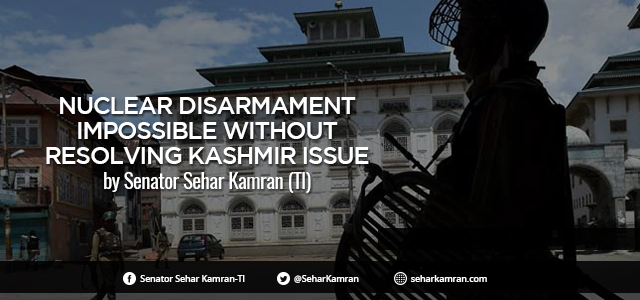 ISLAMABAD: Senator Sehar Kamran jolted the world that nuclear disarmament is impossible without resolving long standing Kashmir dispute, an issue of nuclear flash point in South Asia while suggested urgent Indo-Pak dialogues on nuclear confidence building and risk reduction measures.
ISLAMABAD: Senator Sehar Kamran jolted the world that nuclear disarmament is impossible without resolving long standing Kashmir dispute, an issue of nuclear flash point in South Asia while suggested urgent Indo-Pak dialogues on nuclear confidence building and risk reduction measures.
President Center for Pakistan and Gulf Studies (CPGS) was speaking at the report launching ceremony of a successful seminar (held on May 7th, 2014) titled “Nuclear Non-proliferation, Arms Control and Disarmament—Contemporary Challenges and Prospects”, under the series of mega-project “JOHAR — contemporary debate in the second nuclear age” organized in close cooperation with Konrad-Adneaur-Stiftung (KAS).
Report highlights variety of international perspectives on challenges being faced by existing Non-Proliferation Treaty (NPT) regime and Pakistani position on it.
Report has given very pertinent recommendations to turn this globe a peaceful nuclear world, report recommends Pakistan and other non-NPT nuclear powers inclusion within global non-proliferation regime, states security interests must be given equal consideration; address the actual causes of developing nuclear weapons, commitment for nuclear disarmament within a time frame, promotion of peaceful uses of nuclear technology, a universal, unconditional and legally binding treaty on security assurances offered by the NPT-nuclear weapon states, threats of destabilizing technologies must be minimized like anti-ballistic missile systems, international legal regime must be strengthened against militarization or weaponization of outer-space and cyber-space by both state or non-state actors.
Regarding the region, report recommends that must inclusion of Pakistan in NSG without any discrimination and for long-term stability in South Asia, both India and Pakistan should talk on nuclear confidence building and risk reduction measures.
While addressing the gathering, Senator Kamran jolted the international community that a priority based attention must be given to resolve long standing Kashmir dispute, as the issue is clearly a nuclear flash point between Pakistan and India while unveiling energy discrimination, she said that Pakistan’s energy crisis could be minimized by efficient use of nuclear technology but international approach based on discrimination and exceptionalism is a major hurdle.
Turning the other side of the coin, President CPGS cleared that Pakistan remain always a strong supporter of Nuclear Non-proliferation and nuclear disarmament and these efforts have been well recognized at international level but so far without any reward.
“Pakistan possesses adequate expertise and technical human resources in the domain of civil nuclear technology, in position to provide nuclear fuel cycle services under International Atomic Energy Agency (IAEA) safeguards, participate in any non- discriminatory nuclear fuel cycle assurance mechanism and fully qualifies for NSG membership and access must be given to international nuclear export control entities” Senator Kamran emphasized.
She described that Pakistan believes in evolution of an equitable and non-discriminatory international order to pursue a comprehensive disarmament agenda by accommodating the security concerns of all states and for that NPT must be strengthened and the NPT out-layered states should be brought in the mainstream global non–proliferation regime.
Senator Kamran while praising the role of KAS said that this German organization is playing tremendous part in promoting Pak-European Union and Pak-German ties with special emphasis on issues of national and international importance.
Chief Guest of the event Former Interior Minister Senator Rehman Malik was saying that Pakistan is facing internal and external aggression from India but country is safe, externally because of its nuclear deterrence and internally due to armed forces ultimate sacrifices.
Pakistan’s nuclear safety and security stranded are embedded multi layered but international community have made India it’s darling and continues its discriminatory behavior towards Pakistan.
Resident head of Konrad-Adneaur-Stiftung (KAS), Ronny Heine elaborated his thoughts by saying that Germany was one of the leading countries advocating the case of non-proliferation. The seminar was very much important in which leading nonproliferation experts participated and helped to continue the nuclear debate. Now this report comes up with strong recommendations advocating Pakistan’s case.
Furthermore, Member Advisory Board, CPGS Lt. Gen. (R) Syed M. Owais, H.I. (M), Former President, the National Defence University, Islamabad, Lt. Gen. (R) Agha Umar Farooq, H.I.(M) and former Ambassador (R) Munawar Saeed Bhatti emphasized that nuclear disarmament will not happen overnight and never with discrimination, however, efforts of global elimination of these dangerous weapons must go on.
The 181 page report on the international seminar held on May 7 this year documents the proceedings of the seminar and provides the recommendations framed by CPGS on the basis of the presentations and discussions at the seminar.
=============================================
Recommendations
The Seminar served as an important platform to discuss key issues to promote global peace and security and to help achieve the objectives of nuclear non-proliferation, arms control and disarmament. The speakers in their presentations and participants in the question-answer sessions presented their opinions and suggested various steps.
On the basis of discussions during the Seminar, the Centre for Pakistan and Gulf Studies makes the following recommendations:
- The non-NPT nuclear powers, including Pakistan, should be accommodated within the mainstream global non-proliferation regime in a non-discriminatory and equitable manner.
- It must be recognized that one or few states cannot seek absolute security at the cost of others and security interests of all states must be given equal consideration, particularly at multilateral forums.
- Instead of focusing only on the effects, it is imperative to address the actual causes which force states to develop nuclear weapons, including threats from large and growing conventional or nonconventional forces, long-standing, unresolved territorial and other disputes and discrimination in the universal application of international laws, regimes, UN resolutions and norms.
- The onus of nuclear disarmament heavily lies on the nuclear weapon states possessing thousands of weapons, which must demonstrate a renewed and universally verifiable commitment to achieve nuclear disarmament within a reasonable time frame.
- The promotion of peaceful uses of nuclear technology needs a criteria-based and non-discriminatory approach, in accordance with international obligations and under appropriate international safeguards.
- The security assurances offered by the NPT-nuclear weapon states need to be codified in a universal, unconditional and legally binding treaty.
- There is an urgent need to evolve a non-discriminatory international arrangement to address the growing concerns arising from destabilizing technological trends such as the development, deployment and proliferation of anti-ballistic missile systems and related technologies.
- All states should collectively evolve an international legal regime in order to prevent the militarization and weaponization of outer space and offensive and criminal use of cyber space by both states and non-State actors.
- All nuclear weapon States should ensure the security of their respective materials as a national responsibility and consider the issue of existing stocks at the Conference on Disarmament.
- Pakistan fully qualifies for membership of the Nuclear Suppliers Group (NSG) and must be givennon-discriminatory access to international nuclear export control arrangements.
- India and Pakistan should resume their talks on nuclear confidence building and risk reduction measures. Pakistan’s offer of a strategic restraint regime in South Asia provides a useful framework for enhancing strategic stability in the region.
Same version of the article appeared in Associated Press Service
Same version of the article appeared in World Tribune Pakistan


